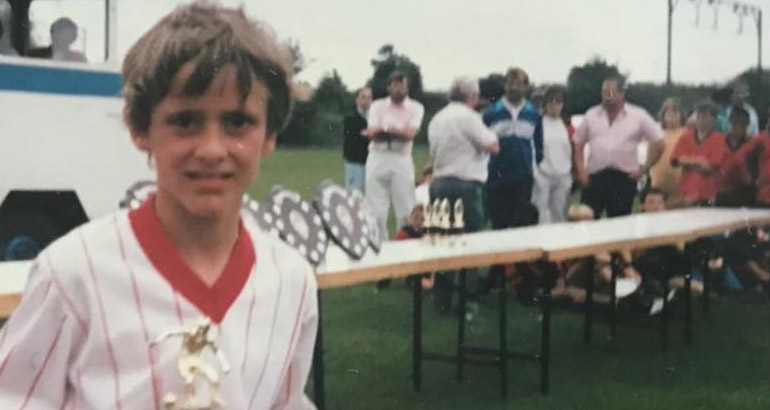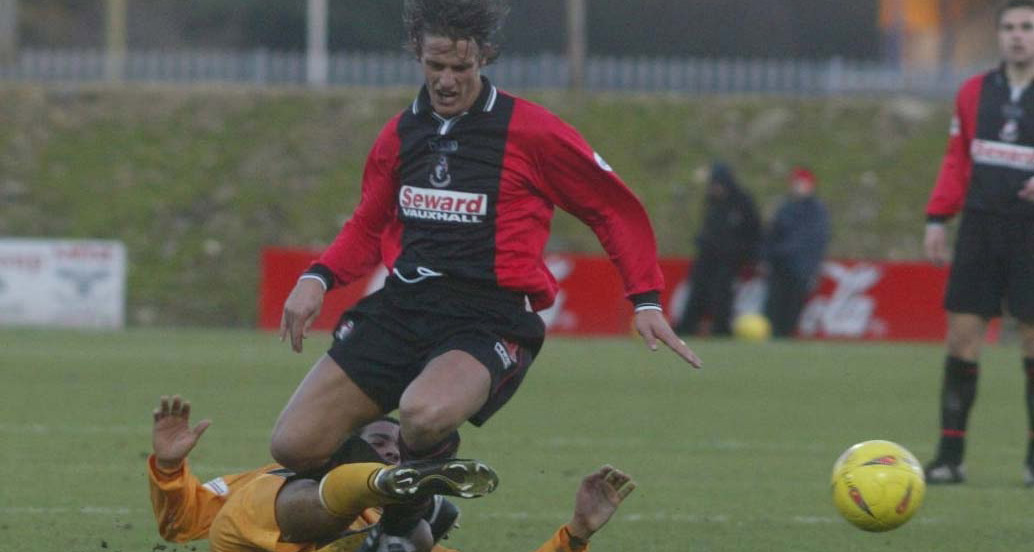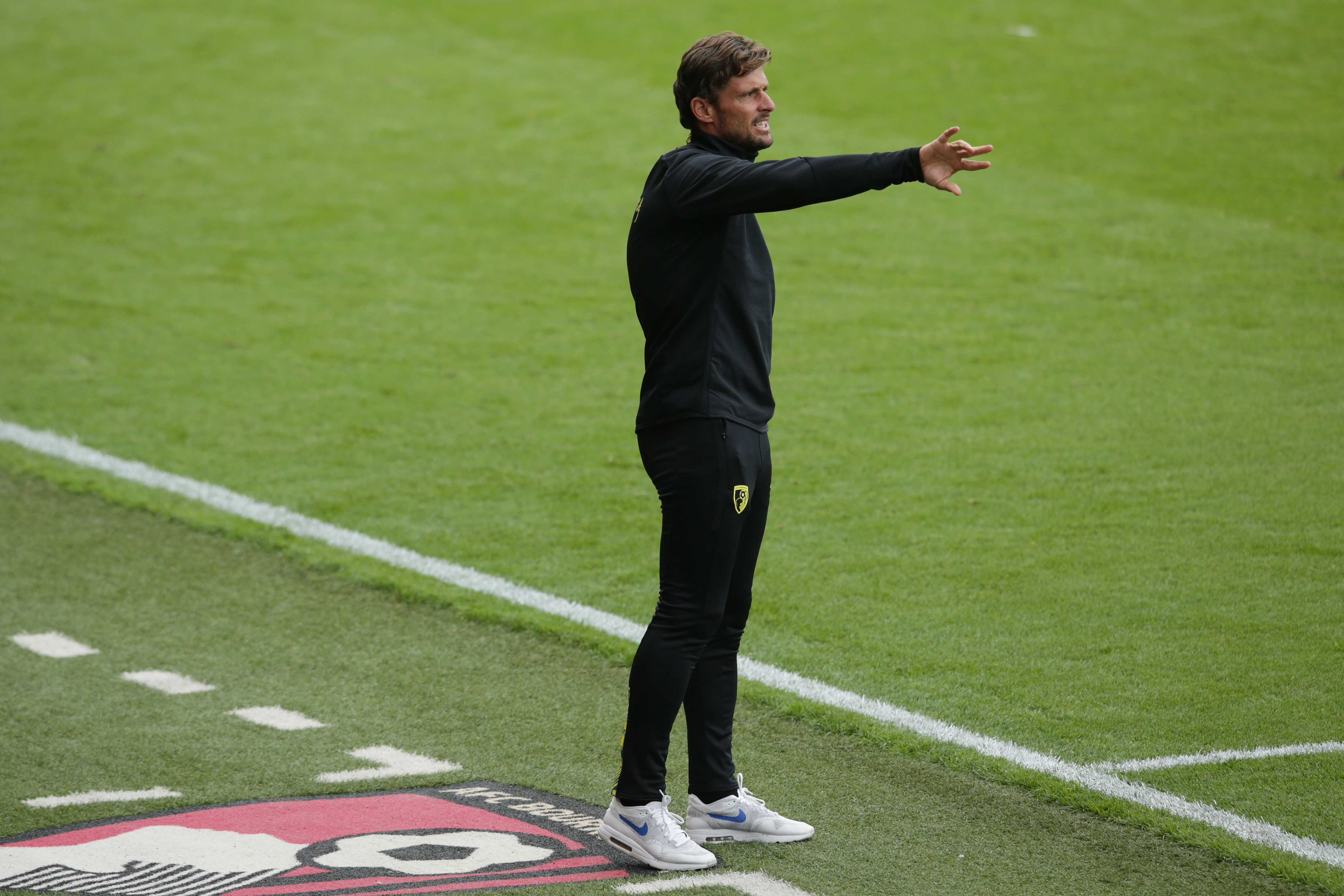
As career milestones go, it was a fairly inauspicious end for Jason Tindall.
His 199th and final appearance for the Cherries saw him replaced by Danny Ings during the closing stages of a 2-1 defeat at Northampton in the Johnstone's Paint Trophy in October 2009.
Little did he know what lay ahead.
After acting as assistant manager for 569 matches and over 22 years after he first joined the club in 1998, Tindall has this weekend been appointed manager of AFC Bournemouth.
Reared playing the Arsenal way, Tindall has gone on to become one of the most decorated coaches in Europe and lists on his CV the prestigious UEFA Pro Licence.
He spent five years on the Gunners' books and was a regular at Highbury as George Graham’s team of the late-80s and early-90s won two league titles, the FA Cup and the League Cup.
Tindall, who was in the same age group as Frank Lampard at Arsenal, joined the club when he was ten before going on to become an apprentice and then a professional at Charlton.

Recalling his formative years with afcb.co.uk, Tindall said: “As a kid, I was a striker. I scored a lot of goals and always played a year up.
“I was doing well and a few clubs showed an interest. I trained at Arsenal, West Ham, Tottenham and Chelsea.
“Nowadays, children go into pre-academies and then academies but it was different then. I played in a Saturday team with Lee Bowyer and Darren Purse and for Senrab, a club formed by my dad, on a Sunday.
“I played for my district, Tower Hamlets, and my county, which was London. Scouts watched the games and you got invited for trials.
“I was guided by my dad and he felt Arsenal would be the right place for me to develop. I was an Arsenal fan and it was the club I felt the happiest at and enjoyed the most. That’s how I ended up signing for them.
“It was a dream for me. We got two tickets for every home game so I would play on a Saturday morning and then dad used to take me to Highbury. I remember going to Villa Park to watch a semi-final and to Wembley for a cup final.
“It was a great experience to be able to train in great facilities and with great coaches and an added bonus to watch your heroes.
“I liked watching Alan Smith, David Rocastle and they had the famous back four – Tony Adams, Steve Bould, Nigel Winterburn and Lee Dixon.
“Perry Groves would come on and score a goal and Paul Merson was breaking through at the time. Ian Wright was my idol as I got older. It was a great team and they were good times.”

After weighing up his options and realising his chances of breaking through at Arsenal could be limited, Tindall headed south of the river to join Charlton.
He served his apprenticeship at The Valley and spent two years at the club as a professional. But although he was once named reserve team player of the year, he never played for the first team.
“It was my choice to leave Arsenal,” said Tindall. “They offered me a YTS and I also had the opportunity to go to West Ham, Tottenham and Charlton.
“Arsenal were the best team in Division One and I looked at a lot of the other young players who were really good but they never got an opportunity.
“My dad told me not to stay just because I was a fan and I loved the club. He told me to think about where would be best for my development.
“Taking all things into account, I felt Charlton would be the best place for me. John Cartwright was youth team manager and he was an excellent coach and a really good football man. I was very fortunate to work with him and learned a lot.
“Keith Peacock was the reserve team manager and he was another good coach. When I went to meet them, they made me feel very welcome and the club had a nice feel to it.

“They brought players through and gave them an opportunity at a young age. I just felt there might be a better pathway and it might be quicker to break through.
“I went through a real growth spurt and had Osgood-Schlatters disease in my knees which set me back.
“As a young player, I was really quick and my pace got me a lot of goals. During the growth spurt, my body changed, I lost a good yard of pace and had a couple of injuries as well.
“John Cartwright converted me into a central midfielder and that’s where I felt I flourished the most. I started to do well and trained with the first team.
“I spent two years there as a pro but didn’t manage to break into the first team. I don’t blame anyone other than myself. Maybe I lacked a bit of belief towards the end and maybe I doubted myself.
“If I could have told myself then what I believe in now, I think it would have been a lot different. With a different mindset and mentality, I think I could have made more of an impact.
“But I wouldn’t change anything. My journey has brought me to where I am today and I’m a firm believer in everything happening for a reason, good and bad.”

While his own playing career started to flourish following his move to Dorset, his son Levi is taking his first steps in the game, playing with the Cherries under-10s last season.
Asked whether he hoped Levi would become a professional footballer, Tindall replied: “As a dad, you want your kids to be happy. I would never push my kids to do something they don’t want to do or they are not interested in.
“At one time, he was playing golf, tennis and football but his love has always been football. So far, he has done well and I’m not just saying that because he is my son.
“Although he scores a lot of goals, I look for other things. The biggest thing is work ethic and I try to instill that in him all the time.
“With the way the game is now, you have to have a good football brain and be technically good to survive and do well.
“If you work hard and make the right decisions, you will have half a chance. You will also need lots of other things to go in your favour but a strong work ethic and football intelligence will stand you in good stead.
“Providing that’s what he wants to do then that’s what I would want him to do. It might change, depending on where he is in three or four years’ time.
“I would never force him to do something for my benefit. I don’t want him to think ‘my dad wants me to be a professional footballer so that’s what I’ve got to do’. He won’t be fully committed if he doesn’t want to do it.”
Pressed into action at Northampton due to the club’s ongoing transfer embargo almost 11 years ago, Tindall went on to play a huge role in the Cherries’ rapid rise to the Premier League.

Now installed as manager, Tindall spoke in his first media interview of the role his boyhood club played in his development as a coach and his ambition to get back to the Premier League to face them as a manager.
“As a professional footballer, your dream is to play at the highest level. I was never able to do that," he said.
“When you go into coaching and management, the next dream is to test yourself at the highest level and, fortunately, I have managed to do that.
"When Ed and myself first got involved in management at Bournemouth, we went to watch Arsenal train a number of times, through contacts we had.
"Arsene was the manager and I don't think anyone could criticise the job and the philosophy that Wenger had and brought to this country.
"We were big admirers of him and Arsenal at the time. It was a philosophy that we really liked, believed in and we tried to implement here.
"That's certainly the philosophy that this football club's seen over the years and it's one we're still trying to build as we go forwards."
"Any boy's dream is to become a professional footballer and when you achieve that, it's then to play at the highest level you possibly can.
"There's no better level than the Premier League and when you move to the other side of the fence and into management, your ultimate goal is to do the same, test yourself in the best possible league in the world.
"That's certainly my goal now."






